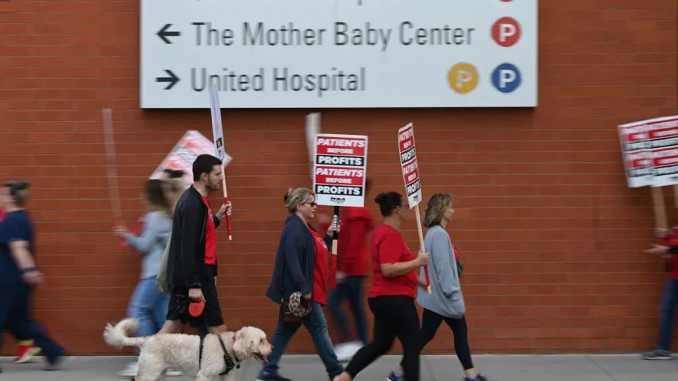
Over 15,000 nurses across Minnesota walked off the job at 16 hospitals from September 12 to 15 for a three-day strike after working without a contract for several months. It is reported as the largest strike ever of nurses in the private sector in the United States.
Of the various grievances, the striking nurses are fighting against inadequate staffing. Some Minnesota nurses work in hospitals that are short up to 10 nurses, forcing them to take on more patients than they can handle. Last year, the Minnesota Nurses Association received 7,857 grievances related to the dangers created from short-staffing.
Before the pandemic, nurses and other healthcare workers faced chronic short staffing across the country. Waiting rooms are often packed and patients are kept in hallways. Nurses are forced into situations where they simply can’t respond to all of the call lights demanding care from patients, which leads to patients getting neglected. This can mean patients soiling themselves because they cannot get the assistance to go to the restroom. And patients can even lose their lives because the nurses can’t respond fast enough when there are life-threatening situations.
The horrors of the pandemic greatly eroded morale in the healthcare industry and made the problem of the preexisting nursing shortage much worse. Many healthcare workers suffer from post-traumatic stress disorder (PTSD). A survey in September last year of over 6,000 nurses found that two-thirds felt that “their experiences during the pandemic have caused them to consider leaving nursing.” According to statistics from the U.S. Department of Labor, the healthcare industry has lost roughly 37,000 healthcare workers from pre-pandemic levels.
In addition to fighting for adequate staffing, the nurses are also fighting for a living wage. At a time when inflation is at its highest in decades, at 8.3% annually, the hospital bosses are offering only a 3-5% annual increase. This would effectively be a pay cut. Nurses are right to say no.
Are we supposed to believe that the hospitals are strapped for cash? Nonsense! The hospital chains received billions of COVID relief dollars from the federal government. To add insult to injury, the hospitals offered to pay $8,000 to strikebreakers for two days of “training” and three days of work replacing the regular nurses.
It remains to be seen how much of an impact the three-day strike will have on the course of negotiations. But what is clear is that the nurses are tired of being overworked and undervalued and are ready to fight back. Rather than an end, this could be the beginning of a bigger fight.
Besides the nurses in Minnesota, nurses in Michigan are currently in a contract fight, therapists in California and Hawaii have been on strike for a month, railroad workers are still in a struggle in which the Biden administration has intervened on the side of the bosses, and more is happening. Workers everywhere share similar, big problems. Whether in health care or freight transportation, we won’t win what we deserve without a fight.




